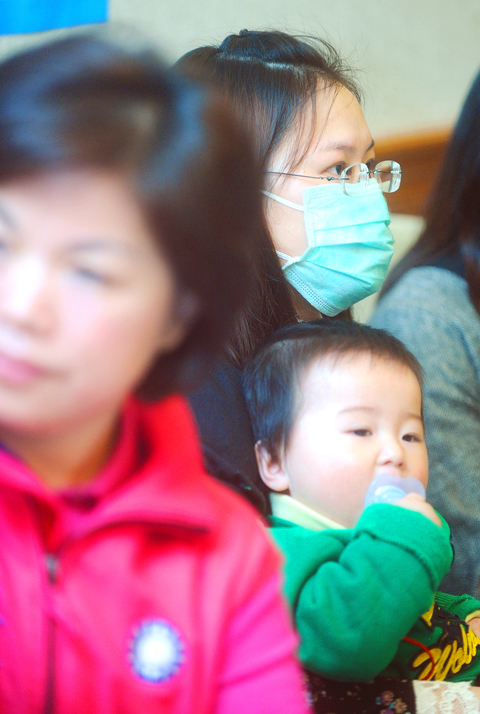Chinese Nationalist Party (KMT) Legislator Yang Chiung-ying (楊瓊瓔) yesterday questioned the Department of Health’s policy of encouraging pregnant women to receive the swine flu vaccine.
At a press conference in the legislature, Yang said that many countries, including the US and Japan, had barred pregnant women from receiving versions of the vaccine that contained adjuvants — immunological agents that are used to modify the effects of a vaccine.
“In Canada, [doctors] will not agree to give the [H1N1] vaccine with adjuvants to women who have been pregnant for more than five months unless vaccines without adjuvants are seriously insufficient,” Yang said, adding that Israel prohibits pregnant women from receiving the shots.

PHOTO: WANG YI-SUNG, TAIPEI TIMES
Yang expressed her concern after the Centers for Disease Control (CDC) repeatedly urged pregnant women to get vaccinated against the flu.
CDC figures show that 878 victims of swine flu have been hospitalized in Taiwan and 38 have died.
Among the fatalities, 33 were pregnant, overweight, had cardiac problems, diabetes or renal problems. None had received the vaccine.
CDC spokesman Shih Wen-yi (施文儀), who was present at the conference, said he had never heard of such a ban.
“As far as I know, I’ve never heard of [the ban]. There must be some misunderstanding,” Shih said.
Shih said the Novartis vaccine contains adjuvants, while the local version produced by Adimmune does not.
“But in accordance with the WHO’s Briefing Note 14, all pregnant women should receive [H1N1] vaccines with or without adjuvants regardless of whether they are in the first, second or third trimester of pregnancy,” Shih said.
In related news, the CDC’s Vaccine Injury Compensation Program (VICP) yesterday completed investigations into three new complaints concerning injuries possibly related to the swine flu vaccine and said none was related to the vaccine.
VICP members met on Wednesday to discuss the three cases and the results of the meeting were made public in a press release yesterday.
The first case involved a 74-year-old woman suffering from high blood pressure, liver problems and diabetes. She developed red and swollen skin and eye secretions.
She was diagnosed with Stevens-Johnson syndrome, a skin condition where cell death causes the epidermis to separate from the dermis, a condition that is believed to be related to the immune system.
Rejecting any link to the vaccine, the VICP said the victim’s family members should file a drug compensation complaint with the CDC.
The second case involved a 52-year-old male with renal problems. He developed breathing difficulties on the day he received the vaccine. Three days later, physicians diagnosed him with a lung infection and he died after his condition became critical.
The final case involved a 14-year-old girl who began to feel dizzy after receiving the vaccine. Six days later, she went to hospital for a check up, but the results showed she was fine despite claims that she had difficulty urinating.
The VICP said it has received a total of 127 swine flu vaccine-related complaints so far. VICP members have investigated 28 cases, ruling that 26 were unrelated to the vaccines while two resulted in compensation.

Three Taiwanese airlines have prohibited passengers from packing Bluetooth earbuds and their charger cases in checked luggage. EVA Air and Uni Air said that Bluetooth earbuds and charger cases are categorized as portable electronic devices, which should be switched off if they are placed in checked luggage based on international aviation safety regulations. They must not be in standby or sleep mode. However, as charging would continue when earbuds are placed in the charger cases, which would contravene international aviation regulations, their cases must be carried as hand luggage, they said. Tigerair Taiwan said that earbud charger cases are equipped

Foreign travelers entering Taiwan on a short layover via Taiwan Taoyuan International Airport are receiving NT$600 gift vouchers from yesterday, the Tourism Administration said, adding that it hopes the incentive would boost tourism consumption at the airport. The program, which allows travelers holding non-Taiwan passports who enter the country during a layover of up to 24 hours to claim a voucher, aims to promote attractions at the airport, the agency said in a statement on Friday. To participate, travelers must sign up on the campaign Web site, the agency said. They can then present their passport and boarding pass for their connecting international

UNILATERAL MOVES: Officials have raised concerns that Beijing could try to exert economic control over Kinmen in a key development plan next year The Civil Aviation Administration (CAA) yesterday said that China has so far failed to provide any information about a new airport expected to open next year that is less than 10km from a Taiwanese airport, raising flight safety concerns. Xiamen Xiangan International Airport is only about 3km at its closest point from the islands in Kinmen County — the scene of on-off fighting during the Cold War — and construction work can be seen and heard clearly from the Taiwan side. In a written statement sent to Reuters, the CAA said that airports close to each other need detailed advanced

The age requirement for commercial pilots and airline transport pilots is to be lowered by two years, to 18 and 21 years respectively, to expand the pool of pilots in accordance with international standards, the Ministry of Transportation and Communications announced today. The changes are part of amendments to articles 93, 119 and 121 of the Regulations Governing Licenses and Ratings for Airmen (航空人員檢定給證管理規則). The amendments take into account age requirements for aviation personnel certification in the Convention on International Civil Aviation and EU’s aviation safety regulations, as well as the practical needs of managing aviation personnel licensing, the ministry said. The ministry